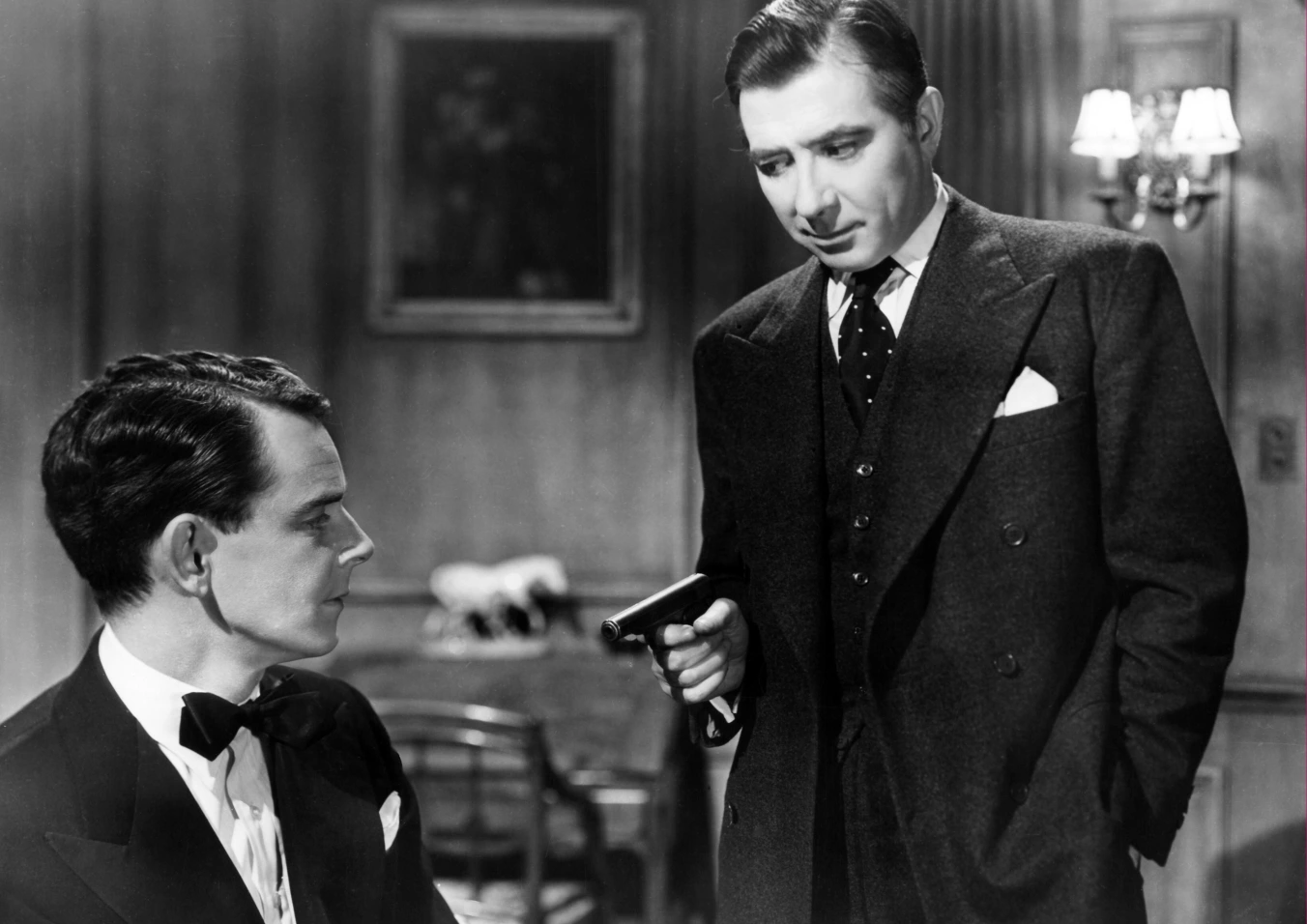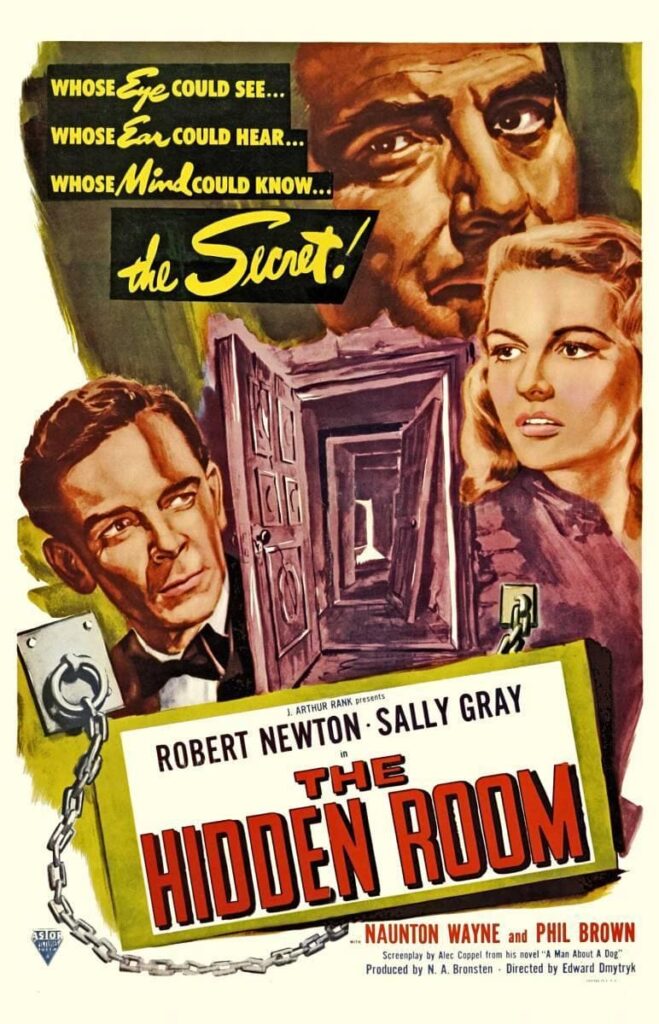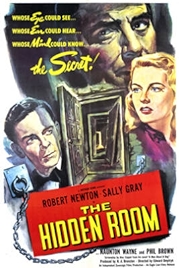In 1948 the brilliant director Edward Dmytryk left the United States in a hurry. He’d just been sentenced to prison time for failing to testify before the House UnAmerican Activities Committee. One of the so-called Hollywood Ten, Dmytryk fled to the UK, where he made a couple of films before his passport ran out and he returned to the US to face the music, and jail.
The first of those films was Obsession, released in the US as The Hidden Room. Dmytryk is often remembered as the director of all-American movies, like the Philip Marlowe mystery Murder, My Sweet (also known as Farewell My Lovely). Obsession isn’t as noirish in any sense but it is a superb crime drama, one saturated with British politesse, restraint and understatement.
After an opening scene set in a gentleman’s club full of armchair warriors bemoaning the state of everything, the rise of the USA, the fall of the Empire and the shocking diction of some colonials, Canadians in particular (Dmytryk was Canadian so this is probably a joke), the action proper gets underway.
Dr Clive Riordan (Robert Newton) knows that his wife, the appropriately named Storm (Sally Gray), is having an affair with an American “pal”, Bill Kronin (Phil Brown). So he tells her he’ll be out of London for a few days, then ambushes Storm and Bill at his family home where they’ve returned from a fun night out to have a nightcap and who knows what else.
Clive has a gun and has decided that the way to deal with Bill is to kill him. But not immediately. Instead Clive has a plan: to keep Bill chained in a hidden room for some time, till concerns about Bill’s disappearance have died down and Clive can be sure he’s not in the frame. Then he’s going to murder Bill and dissolve his body in a bath of acid. Being a doctor gives him access to the necessary chemicals.
Bill is manacled to a wall, but Clive keeps his incarceration relatively comfortable, bringing Bill cold roast chicken and dry martinis, all the while addressing him in the most courteous manner. Bill responds similarly, though in his case every “You’re too kind,” and “Don’t worry about it, old man” comes sprinkled with irony.
They chat about all sorts of things, including Clive’s plans for Bill’s future, or lack of it, in the way two men might address each other before a duel, equals unto the last. These sharply written interchanges where malice lurks beneath a layer of formality aren’t just a lovely study in psychology, they also usefully let audiences in on the doctor’s thinking.
Directing with skill, Dmytryk keeps the two men moving and sparring with energy in the narrow confines of the cell, and slides the camera about in an attempt to keep a stagey play from seeming too much like one. Newton is particularly good. Possibly aiming at James Mason, his portrayal of a man who’s gone to the bad is sympathetic – he’s a belittled, cuckolded husband after all – and Clive’s pain is written on Newton’s face, with not a hint of the gurning and winking Newton is known for (though he was apparently always drunk on set, so he’s true to form at least in that respect). Brown, too, is good as the cocky, vigorous American (“overpaid, oversexed and over here,” as the wartime triplet went) though he’s got less to do. Sally Gray as the noirish wife, dangerously sexualised with breasts that look like loaded weapons, gives it the full va-va-voom. Rounding out this excellent cast is Naunton Wayne as Inspector Finsbury, the cop who eventually arrives to disturb Clive’s plans and who, like everyone else in this film, has motives belied by his manner.
It’s no surprise to find that Alec Coppel first wrote the screenplay as a stage play, A Man about a Dog. It opened in 1946, the same year as JB Priestley’s An Inspector Calls opened in London. If A Man about a Dog had come out any later it would be easy to accuse Coppel of having lifted the sly, smart, all-knowing, ever-present Finsbury straight from Priestley’s play. But it didn’t. It must have just been a coincidence they’re so alike.
An avenging angel in gabardine, Finsbury is another deep, deep well of fine manners, a well spoken Superintendent who’s frightfully, frightfully apologetic about all the inconvenience he’s putting the doctor to when he turns up to interview and imperceptibly undo him.
Coppel was an Australian and with a colonial’s outsider view on the mother country’s peccadilloes he makes Obsession not just a crime thriller but an examination of British manners. And in the end the plot pivots on an irregularity in that area – no spoilers, it’s really worth waiting for.
It’s an excellently tight, neatly pyschological crime thriller and it doesn’t get as many hurrahs as it should. All this and a cute dog called Monty – as the dog the man was all about – who turns out in the end to have a decisive role. Woof!
Obsession aka The Hidden Room – Watch it/buy it at Amazon
I am an Amazon affiliate


